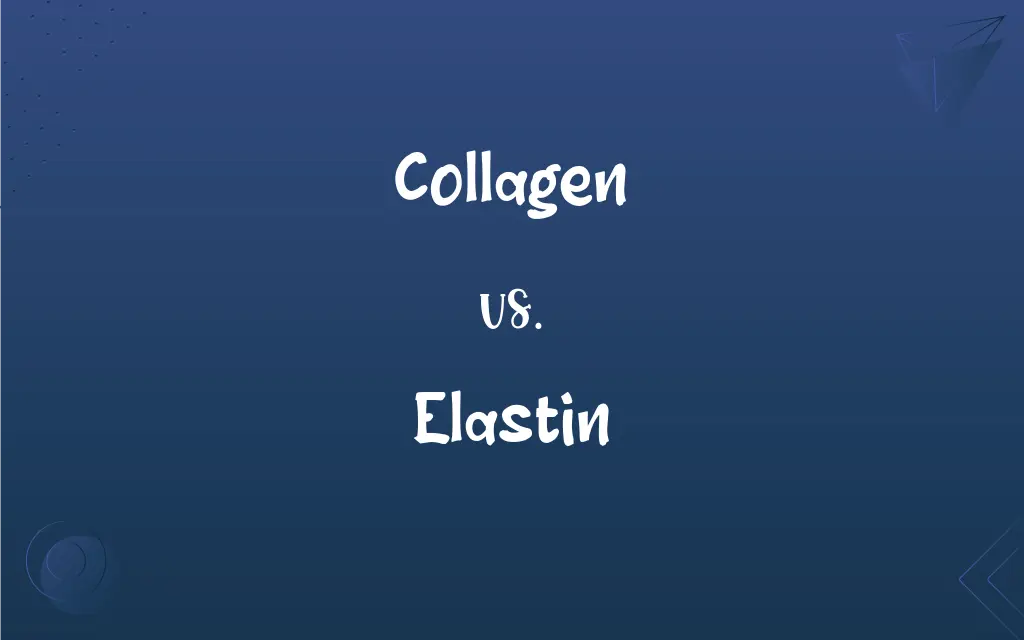Collagen vs. Elastin: What's the Difference?
Edited by Aimie Carlson || By Harlon Moss || Updated on October 28, 2023
Collagen provides structure and strength to tissues; elastin offers elasticity and flexibility.

Key Differences
Collagen, a protein abundant in connective tissues, imparts strength and rigidity. Elastin, on the other hand, bestows flexibility, allowing tissues to resume their shape after stretching or contracting.
Collagen, the most plentiful protein in humans, forms the foundation of skin, bones, and tendons. Elastin is less abundant but critical in areas requiring elasticity, such as lungs, arteries, and skin.
Collagen's triple helix structure gives it tensile strength. In contrast, elastin's random coil configuration facilitates stretching and recoiling.
Aging leads to reduced collagen, causing wrinkles and weakened joints. Elastin deterioration also contributes to sagging skin and less resilient tissues.
Collagen is widely used in skincare and supplements for its perceived benefits to skin and joints. Elastin finds use in products aiming to enhance skin elasticity.
ADVERTISEMENT
Comparison Chart
Primary Function
Provides strength and structure
Offers elasticity and flexibility
Location in Body
Abundant in skin, bones, tendons
Found in lungs, arteries, skin
Molecular Structure
Triple helix form
Random coil configuration
Age-Related Changes
Decreases with age, causing wrinkles
Deteriorates, affecting elasticity
Product Use
Used in skincare, supplements
Used in elasticity-enhancing products
ADVERTISEMENT
Collagen and Elastin Definitions
Collagen
Collagen is a protein that provides structural support to tissues.
Collagen supplements are popular for maintaining skin health.
Elastin
Elastin is a protein that gives tissues elasticity and flexibility.
Elastin allows the skin to return to its shape after stretching.
Collagen
Collagen is the most abundant protein in the human body.
As we age, our body's collagen production declines.
Elastin
Elastin helps tissues resume shape after contracting.
Elastin is important for arterial flexibility during blood flow.
Collagen
Collagen forms the foundation of skin, bones, and connective tissues.
Collagen is essential for maintaining skin elasticity.
Elastin
Elastin's presence is vital in areas like lungs and arteries.
Healthy elastin levels ensure proper lung function.
Collagen
Collagen contributes to the strength and rigidity of tissues.
Athletes often take collagen to support joint health.
Elastin
Elastin is less abundant than collagen but crucial for flexibility.
Elastin degradation leads to less supple skin.
Collagen
Collagen's triple helix structure imparts its strength.
Scientists study collagen's structure to understand tissue resilience.
Elastin
Elastin's random coil structure enables stretching and recoiling.
The elasticity of blood vessels relies on elastin's unique structure.
Collagen
Any of a class of extracellular proteins that are composed of three coiled polypeptide chains, form strong fibers, and are the main constituents of cartilage, bone, and other connective tissues in animals.
Elastin
A protein similar to collagen that is the principal structural component of elastic fibers.
FAQs
How are collagen and elastin different in function?
Collagen provides strength; elastin offers elasticity.
Where is collagen mostly found?
Collagen is abundant in skin, bones, and connective tissues.
Where is elastin primarily located?
Elastin is found in areas needing flexibility, like lungs and skin.
What foods are good for collagen and elastin?
Foods rich in vitamin C and protein can support collagen and elastin health.
How do collagen and elastin impact wound healing?
Both proteins are crucial for tissue repair and wound healing.
Can exercise influence collagen and elastin levels?
Exercise can help maintain healthy levels of these proteins.
What is collagen?
Collagen is a structural protein providing strength to tissues like skin and bones.
Is elastin important for cardiovascular health?
Yes, elastin's flexibility is crucial for healthy blood vessel function.
What is elastin?
Elastin is a protein that imparts elasticity and flexibility to tissues.
Can collagen and elastin be replenished through diet or supplements?
Yes, certain foods and supplements may help support collagen and elastin levels.
Do men and women differ in collagen and elastin levels?
Levels vary individually, but both genders experience age-related declines.
How does UV exposure affect collagen and elastin?
UV exposure accelerates the breakdown of both proteins in the skin.
How does aging affect collagen and elastin?
Aging reduces collagen and elastin, impacting skin and tissue elasticity.
What role does collagen play in joint health?
Collagen supports joint strength and can alleviate joint issues.
Can topical products enhance collagen and elastin in the skin?
Some products claim to boost these proteins, but efficacy varies.
Are there any medical treatments to improve collagen and elastin?
Treatments like laser therapy can stimulate collagen and elastin production.
Are there genetic factors influencing collagen and elastin production?
Yes, genetics can affect the levels and quality of these proteins.
Are collagen and elastin used in skincare?
Both are used in skincare, collagen for structure, and elastin for elasticity.
What factors degrade collagen and elastin?
Sun exposure, smoking, and aging can degrade both proteins.
Does smoking affect collagen and elastin?
Smoking accelerates the degradation of both collagen and elastin.
About Author
Written by
Harlon MossHarlon is a seasoned quality moderator and accomplished content writer for Difference Wiki. An alumnus of the prestigious University of California, he earned his degree in Computer Science. Leveraging his academic background, Harlon brings a meticulous and informed perspective to his work, ensuring content accuracy and excellence.
Edited by
Aimie CarlsonAimie Carlson, holding a master's degree in English literature, is a fervent English language enthusiast. She lends her writing talents to Difference Wiki, a prominent website that specializes in comparisons, offering readers insightful analyses that both captivate and inform.
































































